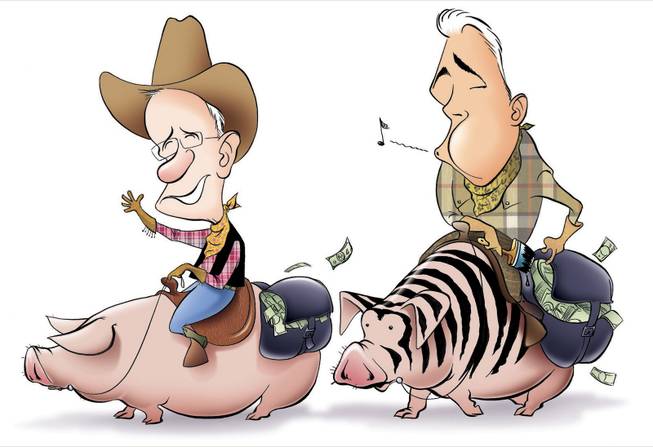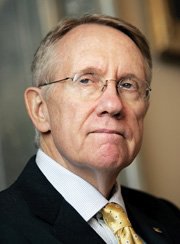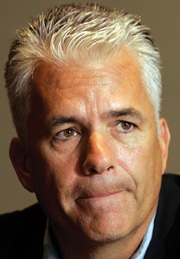Sunday, March 15, 2009 | 2 a.m.
Sun Archives
- Expect help, not public works monuments (3-10-2009)
- From receiving end, earmarks look good (3-1-2009)
- Stimulus scroogery was fated for state (3-1-2009)
- Louder now: No on pork for mob museum (1-8-2009)
- Does party have Reid over a pork barrel? (3-12-2008)
Sun archives
Sun Blogs
Nevada’s two senators, Democrat Harry Reid and Republican John Ensign, both bring federal money to the state in sizable if not equal shares, earmarking millions of dollars annually for water projects, police departments and other needs up and down Nevada.
In the $410 billion omnibus spending bill passed by Congress and signed into law by President Barack Obama, they successfully supplemented Nevada’s troubled state budget with an assist from the federal government.
But the two senators differ greatly on how they let the state know of their deeds.
On the day Congress approved the spending bill for fiscal 2009, Reid’s office announced more than $100 million he had secured for Nevada.
Reid touted earmarks that included $376,000 for an arid rangeland program at the University of Nevada, Reno, and $200,000 for youth programs at Boys Town of Las Vegas.
Ensign secured more than $50 million, including funding for some of the same projects Reid trumpeted, but he gave little indication of the accomplishment.
Instead, Ensign was on Fox News decrying “this pig of a bill.”
The two approaches show the political and attitudinal divide in Washington over the way budgeting works, and the conflicts lawmakers face as they try to burnish their fiscally prudent credentials while delivering for constituents back home.
Steve Ellis, vice president of the fiscal watchdog group Taxpayers for Common Sense, said the difference lies not only in party affiliation or political persuasion but also in the way lawmakers earned their chops.
Reid came to prominence on the Senate appropriations committee, seeing firsthand the power and influence that comes from delivering for home state needs. Ensign rode into Congress on the conservative wave of 1994 with its near-religious belief in smaller government.
“Sen. Reid, through and through, is an appropriator,” Ellis said. That Reid unabashedly supports earmarks is not surprising.
“Sen. Ensign appears to have a more conflicted relationship,” Ellis said. “He’s railing against earmarks but he also benefits. There’s some ambivalence and squeamishness about them, but he’s getting them.”
Obama was roundly criticized for signing the $410 billion bill with more than 8,500 specially marked pet projects for lawmakers. He said he would rather hold his nose and sign the bill at this point than pick a fight with his fellow Democrats in Congress while he is trying to address many other major issues.
As he signed the bill, Obama also spoke of putting further limits on earmarks, including calls for greater transparency.
Still, many critics derided the bill, with its 8 percent increase in spending over last year’s levels, even as spending on earmarks was down in fiscal 2009 by $500 million, according one analysis.
Public opposition raged, egged on by continuous coverage on the cable news shows and talk radio.
Even Reid’s own party temporarily revolted over the spending, momentarily derailing the bill’s passage in a surprise blow to Democratic Party unity in Washington. Republicans had just under half the earmarks in the bill.
Reid can at times seem tone deaf to complaints about earmarks. When asked by Nevada reporters what he had to say to those who criticized the earmarks in the bill, Reid bellowed: “What I would say to them is they should get a life.”
“We should do a poll for everything we do here?” he asked.
Reid defends earmarking, accurately, as a practice as old as the Constitution. As a senator, he said, he knows more about Nevada’s needs than a bureaucrat in Washington entrusted with doling out federal money, often by formulas.
In fact, as earmarks have been a long-standing tradition in Washington and a key source of political and monetary capital for lawmakers to spend back home.
But the practice of funneling money to pet projects grew at alarming rates as Republicans controlled Congress early in the decade, multiplying to more than 16,000 by 2005. The source of the earmarks was often all but impossible to discover.
Earmarks became sullied during the Jack Abramoff lobbying scandal as they were seen as being swapped for gifts and campaign cash — turning Congress into what some called a favor factory.
Republicans “really messed it up for everybody,” Reid said. Yet Democrats, too, participated in the expansion.
Democrats instituted some of the most expansive reforms in history when they took control of Congress in 2007, namely by requiring that lawmakers sign their names to their spending requests.
Ellis disputes Reid’s contention that the upcoming fiscal 2010 spending bills will have a 50 percent decrease in the amount spent on earmarks, saying it will be more like a 25 percent drop. But he commends Reid for presiding over an important first step. “Even though he opposed it at times, he has presided over increased transparency in the earmark system,” Ellis said.
Still, the complaints over earmarks rage on, coming mainly from Republicans, although a few key Democrats have also sworn off the practice.
“We’ve heard about all the earmarks,” Ensign said on the floor of the Senate after the bill passed, noting a $1.79 million earmark “for swine odor and manure management research.
“Now, I’m a veterinarian by profession. I understand that pigs smell and pig farms smell worse than almost anything else,” Ensign went on. “But when did it become the responsibility of the federal government to control pig odor?”
Yet Ensign himself secured millions for pet projects in his home state, spending he says he is proud to put his name on.
Ensign routinely explains that he doesn’t oppose all earmarks, only the frivolous or wasteful ones. His earmarks, he believes, do not fall in that category.
“Ensign’s requests are worthwhile and can be defended in public,” said Ensign’s spokesman, Tory Mazzola. “Earmarks are a way for smaller states to compensate for other government funding that may not be sufficient.”
Nevertheless, Ensign voted against the spending bill, opposing what he calls the wasteful spending in the package.
As for the $50 million he had secured for Nevada — most if not all of that money will flow to the state now that the bill has been signed into law.
Lisa Mascaro can be reached at (202) 662-7436 or at [email protected].




Join the Discussion:
Check this out for a full explanation of our conversion to the LiveFyre commenting system and instructions on how to sign up for an account.
Full comments policy